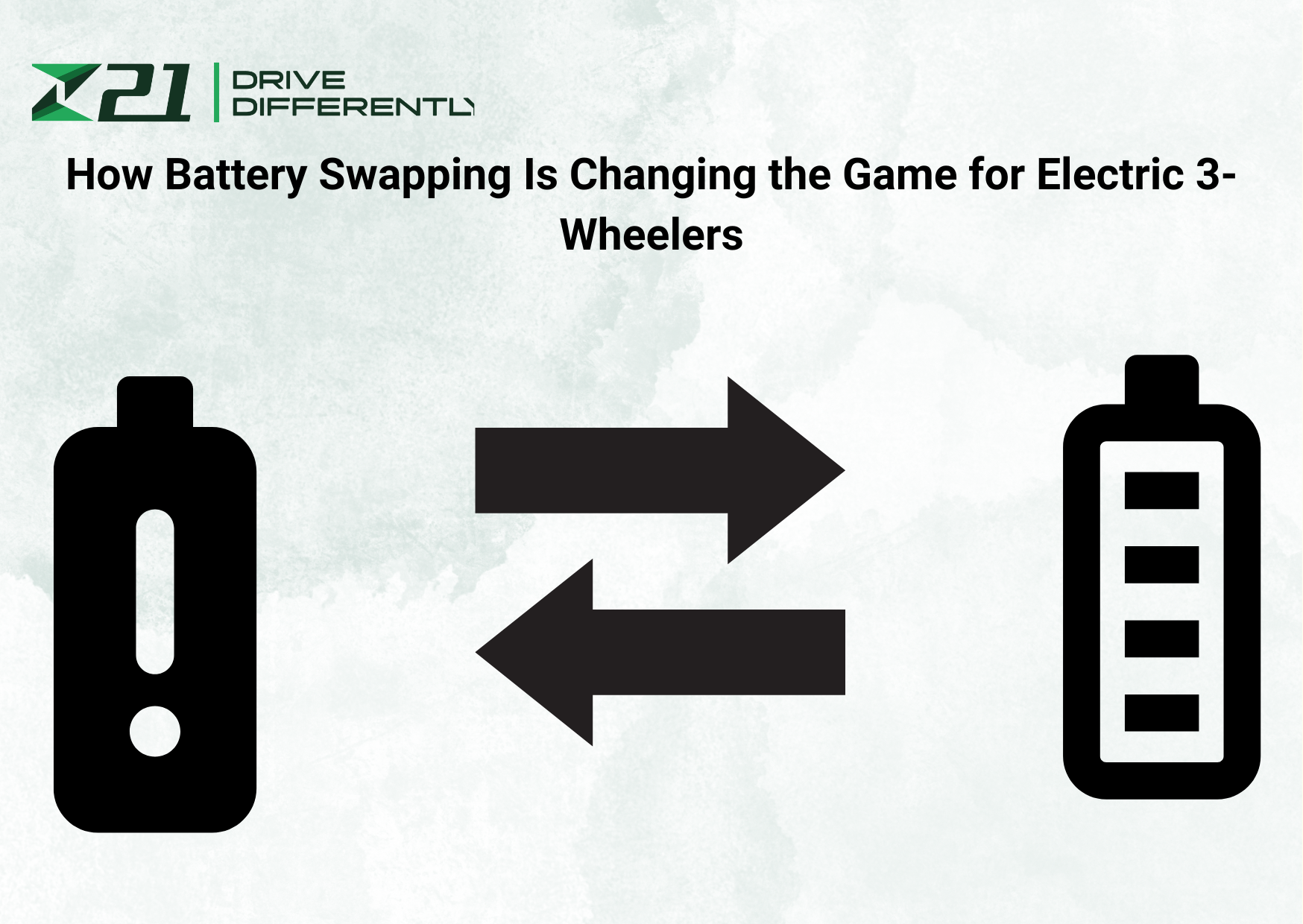The electric vehicle (EV) industry is undergoing a massive transformation, and electric 3-wheelers are at the forefront of this revolution. A significant innovation that is changing the game for these vehicles is battery swapping for electric 3-wheelers. As the demand for eco-friendly transportation grows, fleet owners and individual drivers are increasingly looking for solutions that allow for uninterrupted, efficient, and cost-effective operations. Battery swapping has emerged as a powerful solution that meets these needs and is set to redefine how electric 3-wheelers are utilized.
Understanding Battery Swapping for Electric 3-Wheelers
Battery swapping is a technology where the depleted battery of an electric vehicle is replaced with a fully charged one at designated swapping stations. For electric 3-wheelers, this concept is proving to be a game-changer. Instead of waiting for hours to charge an electric vehicle, fleet owners and individual operators can quickly swap the discharged battery with a fully charged one, allowing them to get back on the road almost immediately.
This technology is especially relevant for businesses that rely on electric 3-wheelers for deliveries and transportation. Since electric 3-wheelers are designed for last-mile connectivity and frequent trips, downtime due to long charging times can result in operational delays and loss of business. Battery swapping for electric 3-wheelers offers a quick, efficient, and reliable solution to this problem, ensuring vehicles are back on the road faster.
Benefits of Battery Swapping for Electric 3-Wheelers
- Reduced Downtime
For fleet owners, time is money. Downtime due to charging can lead to delays and missed opportunities. Battery swapping for electric 3-wheelers minimizes this downtime, allowing for seamless operations. With the ability to swap batteries in just a few minutes, fleet owners can significantly improve the productivity of their vehicles, ensuring that their fleet operates continuously throughout the day. - Cost-Effective Solution
One of the primary concerns for fleet owners transitioning to electric 3-wheelers is the high initial cost of the battery. With battery swapping, the cost burden is shared. Fleet owners can choose to rent or lease batteries, avoiding the upfront costs of purchasing expensive lithium-ion batteries. This approach makes battery swapping for electric 3-wheelers a more affordable solution for many businesses, especially small to medium-sized enterprises looking to adopt green transportation solutions without incurring high costs. - Extended Battery Life
Batteries for electric 3-wheelers can degrade over time, leading to reduced range and efficiency. With battery swapping for electric 3-wheelers, the battery used in each vehicle is periodically replaced with a fresh one, ensuring that fleet operators always have access to high-performance batteries. Additionally, since the batteries are maintained and monitored at swapping stations, they are kept in optimal condition, which extends their overall lifespan. - Faster Charging and Higher Efficiency
Traditional charging methods can take several hours to recharge a vehicle fully. This is a significant concern for electric 3-wheeler fleet owners, especially those in industries where time is critical, such as logistics and delivery services. Battery swapping for electric 3-wheelers eliminates this problem by offering fast exchanges that take only a few minutes. This efficiency is a key factor in improving the overall productivity of electric fleets. - Increased Range and Flexibility
With battery swapping for electric 3-wheelers, fleet owners can extend the range of their vehicles. By having access to fully charged batteries at any time, drivers can operate their vehicles for longer periods without worrying about running out of power. This flexibility is particularly beneficial for long-distance trips or during peak hours when the demand for deliveries or services increases.
The Role of Infrastructure in Battery Swapping for Electric 3-Wheelers
For battery swapping for electric 3-wheelers to succeed, robust infrastructure is essential. The establishment of swapping stations at key locations, including near commercial hubs, delivery centers, and along highways, is critical for this system to operate efficiently. Government support and investment in building this infrastructure will play a vital role in making battery swapping a mainstream solution for electric 3-wheeler operators.
Furthermore, advancements in smart technology are improving the efficiency of these swapping stations. With automated systems that monitor battery health and performance, operators can ensure that they are swapping their vehicles’ batteries with the best possible option available.
Challenges and Future of Battery Swapping for Electric 3-Wheelers
While battery swapping for electric 3-wheelers offers a host of benefits, the system is not without its challenges. The establishment of swapping stations requires significant investment, and there are logistical hurdles in managing battery stock and ensuring compatibility across different vehicle models. However, as technology improves and the EV industry matures, these challenges are expected to diminish.
The future of battery swapping for electric 3-wheelers looks promising, with potential innovations in battery technology, infrastructure, and business models. Fleet owners and electric vehicle manufacturers will continue to collaborate to make this solution more efficient, cost-effective, and widely accessible.
Battery swapping for electric 3-wheelers is set to revolutionize the way fleet owners operate their vehicles. By reducing downtime, extending range, and offering a cost-effective and environmentally friendly solution, battery swapping is enabling the growth of electric 3-wheelers in urban logistics. As the infrastructure continues to develop and technology improves, the widespread adoption of electric 3-wheelers and battery swapping will likely become a significant factor in transforming the transportation industry. Written by Zero 21 Autos.


